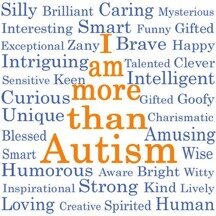
Ben's Story
A Parent Perspective Essay
by
Jack and Sarah
(Ben’s parents)
He shows the triad of impairments that is a feature of autism” said the speech pathologist as our son, Ben, was repeatedly opening and closing cupboard doors in her office. “There is a lot of help out there and he can get better…” she went on to reassure us, but we were no longer listening as that ominous word ‘autism’ numbed us into oblivion. Ben was just turning two; he had no language, but engaged in a lot repetitive behavior, so this assessment should not have come as a complete surprise. He was not responding to his name, he had never pointed and had no idea how to play with his toys – he just moved them from one pile to another!
After leaving the speech pathologist’s office, I went to work and my wife took Ben home, but we both knew that our lives were about to change irrevocably. At least we now understood the reasons for Ben’s constant tantrums and screaming. At 20 months he was assessed to be at a developmental level of a 6 months old infant, so given the severity of Ben’s delay we did not know what to expect in the long term. Inevitably, the question of who would look after him when we are no longer around crossed our minds.
CONTINUE READING HERE…..
But we were lucky in our misfortune. We lived in a big city with a lot of experts on child development and Ben was only two, with many years of early intervention available to us. Two months after the diagnosis, we started an intensive intervention program that was focused on language development, an ABA variant called Verbal Behavior that involved 30-35 hours / week of 1:1 work with Ben. It was carried out at our home, but also out in the community as well as at nursery and later at school, all in order to maximize his generalizing of learnt skills. Ben was rarely set at the table doing discrete trial drills. Instead, his therapists engaged him through play to help him develop play skills and to maintain his high motivation for ‘work’. Despite significant oral motor delays, Ben began to learn very quickly and within a few months he was using two word sentences. The tantrums also reduced a little, as he was now learning to communicate his needs using words and pointing. He made significant progress in the first year, which we later learnt was one of the main indicators for the long-term optimal outcomes.
After leaving the speech pathologist’s office, I went to work and my wife took Ben home, but we both knew that our lives were about to change irrevocably. At least we now understood the reasons for Ben’s constant tantrums and screaming. At 20 months he was assessed to be at a developmental level of a 6 months old infant, so given the severity of Ben’s delay we did not know what to expect in the long term. Inevitably, the question of who would look after him when we are no longer around crossed our minds.
CONTINUE READING HERE…..
But we were lucky in our misfortune. We lived in a big city with a lot of experts on child development and Ben was only two, with many years of early intervention available to us. Two months after the diagnosis, we started an intensive intervention program that was focused on language development, an ABA variant called Verbal Behavior that involved 30-35 hours / week of 1:1 work with Ben. It was carried out at our home, but also out in the community as well as at nursery and later at school, all in order to maximize his generalizing of learnt skills. Ben was rarely set at the table doing discrete trial drills. Instead, his therapists engaged him through play to help him develop play skills and to maintain his high motivation for ‘work’. Despite significant oral motor delays, Ben began to learn very quickly and within a few months he was using two word sentences. The tantrums also reduced a little, as he was now learning to communicate his needs using words and pointing. He made significant progress in the first year, which we later learnt was one of the main indicators for the long-term optimal outcomes.

While his language and academic skills were rapidly developing, Ben still struggled with his emotions, particularly anxiety and explosive anger. Although less frequent than in his earlier years, the temper tantrums continued and at the age of 7, they still made him stand out from his peers. His anger would be triggered by apparently innocuous events, often as a result of his mental rigidity. At that point we targeted his emotional development by teaching him to recognize emotions in himself and in others, to grade them according to their intensity and to understand their causes. We used cognitive behavioral methods (CBT) to help him alter his perception of triggering situations and to teach him alternatives to anger. Slowly he began to use self-talk to reason himself out of getting angry – “my play date is about to finish, but that’s okay, because I can then play on mom’s phone”. Sometimes, when he feels worried, he asks us to remind him of the ‘fun activities’ that day or week, so we provide the self-talk for him.
Today, at the age of eight and a half, Ben is not “recovered”. His inferential thinking is still not perfect and that makes the social interactions somewhat awkward, while the motor coordination difficulties affect his participation in team sports. However, he needs minimal support at school and he has friends, in fact we can’t arrange enough play-dates for him. He loves swimming, karate and chess, but most importantly he is generally a happy child. There is still a lot of hard work ahead, but as an experienced consultant told us recently “Ben is on a trajectory of progress, a trajectory that does not show signs of slowing down, on the contrary”.
That day at the speech pathologist’s office feels decades away, and yet it will stay with us forever.

Many thanks to Ben and his parents for sharing their story. Ben, who is an only child, and his parents live near a large city in the UK. Ben’s mother Sarah attended university where she studied finance and before Ben’s birth had a job as an accountant, and his father Jack is employed as a civil engineer. In order to avoid stigmatizing Ben among his typical peers, they preferred maintaining their anonymity.